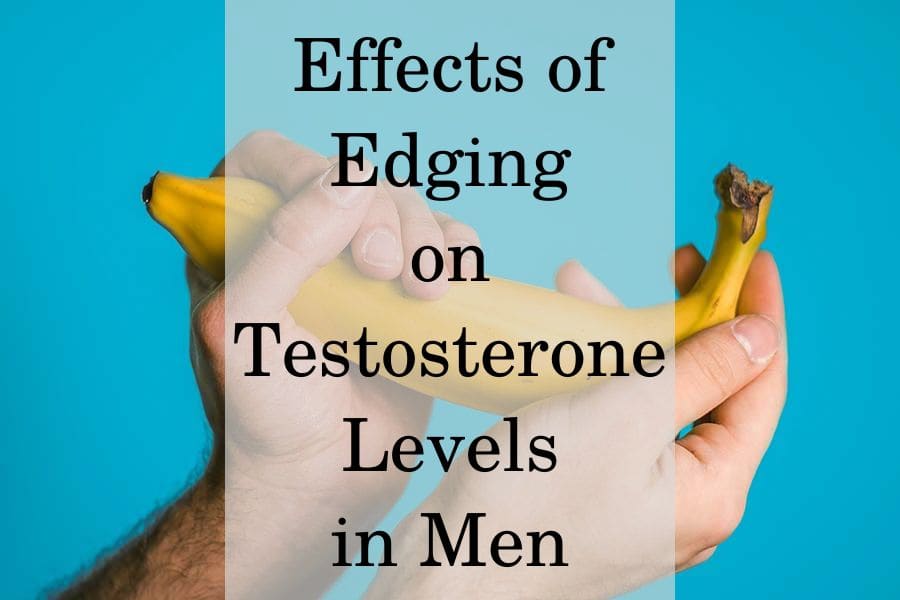Edging is a sexual technique that involves bringing yourself alone or with the help of your partner to the brink of orgasm and then stopping or slowing down the stimulation right before climaxing.
As a result, the orgasm is delayed or may not occur at all if stimulation continues to be interrupted right on the “edge” before falling into sexual climax.
Edging without reaching an orgasm is also sometimes viewed as a potential strategy to boost testosterone (T) in healthy men.
One of the reasons is that semen contains testosterone, and some men are concerned that ejaculating semen during an orgasm can deplete their T levels.
However, there isn’t any evidence to suggest that edging with or without reaching an orgasm has any different effect on testosterone compared to regular sex or masturbation.
What effects should men expect from edging?
During edging, you or your partner can stimulate your genitals or other erogenous zones to the point of almost reaching orgasm and then either stop the stimulation altogether or reduce its intensity.
This will prevent the release of semen and delay the onset of orgasm.
Afterward, the process can be repeated multiple times. Each cycle of buildup and release of sexual tension will potentially result in a more intense and satisfying orgasm when it finally occurs.
In addition to possibly increasing sexual pleasure, edging may also help you to develop better control over your orgasms and sexual responses.
Edging is generally considered to be a safe sexual activity as long as you do not have any underlying health conditions, and it’s done consensually when performed by a partner.
Even if you do not reach orgasm at all after repeated edging, retaining your sperm does not pose any health risks. Your testes produce sperm cells constantly, and if they are not ejaculated, your body breaks them down and reabsorbs them.
Is it healthy to do edging every day?
Edging can be performed as frequently as you wish, depending on your personal preferences, including every day or even several times a day. However, it’s important to note that edging can also have drawbacks.
It can be frustrating or even physically uncomfortable to repeatedly bring oneself or one’s partner to the brink of orgasm without climaxing, and some men may find it difficult to maintain an erection during extended edging sessions.
Additionally, edging can be mentally and emotionally draining, particularly if it becomes a source of pressure or anxiety.
Does edging increase testosterone levels in men?
Unfortunately, there isn’t any research on the effects of edging on testosterone levels in men. However, there is some research on the effects of sexual stimulation without ejaculation in men and changes in T levels.
One study reported that men who were exposed to visual sexual stimuli without engaging in sex and ejaculating experienced about an 11% increase in testosterone levels.
However, it is important to note that those who did participate in sex and ejaculated achieved an even higher increase in T levels. It is unclear if the men also practiced edging before eventually reaching an orgasm.
Some men are concerned about the effects of masturbation on testosterone, particularly because of the ejaculation at the end, as it may drain their testosterone levels. This concern stems from the fact that semen contains testosterone.
However, most studies report that masturbating and ejaculating do not have any particular effect on testosterone levels.
It’s important to note that edging, abstinence from ejaculation, or any other sexual practices are not valuable strategies for managing low testosterone levels in men with hypogonadism.
To successfully alleviate their symptoms, men with low T should seek professional medical help and receive medically-approved treatments such as testosterone replacement therapy (TRT).
Delaying treatment while exploring alternative and ineffective strategies can increase the risk of complications due to low T, such as heart disease and metabolic problems.
Does edging increase sperm count?
Anecdotal evidence suggests that edging may increase the volume of semen which men can release during orgasm, but there is no scientific research on this topic.
The increased semen volume could be caused by the production of more and more fluids by the prostate gland every time a man is near a climax.
However, there is no evidence to suggest that edging may also increase sperm count. Instead, sperm count depends on many factors, including age, diet, overall health, and frequency of sexual activity.
Studies show that frequent ejaculations, for example, daily, can lead to a slight reduction in sperm count and seminal volume.
In contrast, being abstinent for a prolonged period of time will likely result in higher sperm count and ejaculate volume when you eventually have an orgasm.
Yet, the research showed that the frequency of sexual activity does not affect sperm concentration, motility, progressive motility, morphology, vitality, or any functional parameters of sperm cells.
Does edging make you last longer?
Edging may help you last longer during sex because it can help you become more aware of your sexual responses to various stimuli and learn how to control your orgasm in order to avoid ejaculating too quickly.
Additionally, edging can help build sexual stamina over time by gradually increasing the amount of time a person can maintain sexual stimulation without ejaculating.
That being said, every person’s body and sexual response are different, and there is no guaranteed result when it comes to edging and lasting longer.
Some people may find that edging helps them last longer, while others may not see any significant difference.
It’s also important to consider that edging should not be used as the sole technique for managing premature ejaculation or other sexual concerns, as it’s not a form of treatment.
Instead, you should consider seeking the guidance of an experienced healthcare professional who can provide you with more therapeutic options and personalized medical advice.
Can edging cause health problems?
Edging is considered safe for people who have no cardiovascular problems or other contraindications for prolonged physical activity. The practice is not considered harmful, but there are some potential risks associated with it.
For example, edging can sometimes cause physical discomforts, such as genital soreness, pain, or irritation due to prolonged stimulation. Furthermore, ejaculation may become too difficult after repeated edging, and a person may become frustrated.
Prolonged sexual activity, including edging, can increase the risk of infection, such as urinary tract infections or sexually transmitted infections. This risk can be mitigated by practicing safe sex and good hygiene.
For some individuals, the intense focus and control required for edging can lead to anxiety or stress, which reduces overall sexual satisfaction
Edging for prolonged periods, particularly for several hours, can lead to physical and psychological exhaustion, dehydration, and fatigue. This can negatively impact a person’s overall health and well-being.
There is no evidence to suggest that edging can directly cause other health problems, such as erectile dysfunction, prostatitis, infertility, retrograde ejaculation, or testicle pain.
Does abstinence have the same effects?
Abstinence refers to the deliberate choice to refrain from sexual activity altogether, while edging involves engaging in sexual stimulation without reaching an orgasm or significantly delaying the climax.
Edging may help improve orgasm control and help you last longer, while prolonged abstinence may have the opposite effects and even increase the risk of premature ejaculation.
Abstinence can also increase the thickness, volume, and sperm count of the seminal fluid, while frequent ejaculations may slightly reduce those parameters.
In comparison to edging, there is much more research regarding the effect of sexual abstinence on testosterone levels.
However, the research is mixed, and some trials show a brief increase in T after a week of abstinence, while others report a drop in testosterone after prolonged abstinence from ejaculation.
Furthermore, many trials report that sexual abstinence does not have any effect on testosterone levels in healthy men.
Get a free consultation with our medical expert for any questions about hormone replacement therapy



